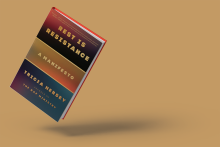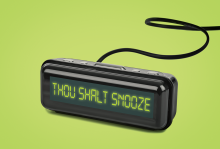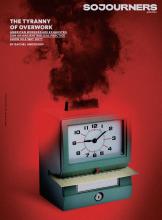overwork

I FIRST BECAME aware of Tricia Hersey’s work through social media (@TheNapMinistry on Twitter, Instagram, and Facebook), and I suspect many others have as well. Yet, Hersey is hardly your run-of-the-mill social media influencer and indeed can be brutally critical of the effects that social media culture has on our bodies and souls. Hersey is a performance artist, activist, theologian, and, perhaps most importantly, a daydreamer. Her work is centered on Black liberation, and particularly liberation from the present-day grind culture of capitalism that is driven largely by social media. In her first book, Rest Is Resistance, she aims to recover the divinity — that is, the image of God — in every human.
Rest Is Resistance is a stunning call to a slower, richer life of faith. Hersey’s writing seems animated by concerns such as those articulated by Rabbi Abraham Joshua Heschel in his classic book The Sabbath. While humanity may live and work in a technological society, both writers argue, we do not have to be subservient to our technological tools. Our technological victories “have come to resemble defeats,” writes Heschel. “In spite of our triumphs,” he continues, “we have fallen victims to the work of our hands; it is as if the forces we had conquered have conquered us.”

IN MARCH LAST YEAR, as I was leaving a medical appointment, a nurse handed me a small, leopard-print cosmetic case with a pink ribbon attached. “A gift from us.”
This is not the kind of gift one wants to receive. I had been diagnosed with breast cancer. It was a welcome-and-sympathy gift wrapped up in one. With two young children distance-learning at home, I had considered a wide range of maladies our family might encounter—from “Zoom fatigue” to learning loss to the coronavirus itself. But not cancer.
My unpreparedness for major illness meant that I had no primary care physician, no relationship with any of the major health systems in my area, and no access to paid leave.
All this despite the fact that I was a professional advocate for family-leave policies. During the last several years, nearly all my working hours were spent researching, writing about, and promoting more humane work and family policies. I have often made this case to employers and legislators: All workers, at some point in their lives, will experience illness, frailty, or the need to care for someone else. It is wiser to anticipate and honor this aspect of humanity than to ignore it.
Now, the human in question is me.
I had not prepared for an illness requiring rest and extensive treatment. Work—both that for which I earn a living and all that goes into raising children and managing a household—played a defining role in structuring my days. Needing to not work was barely imaginable.

American workers are exhausted. Can an ancient biblical practice show us a way out?

As preoccupied as I get with working, I love the deadly sin of sloth.
Rather, I love to think that I’m above it. I value hard work and I work hard. I judge my days by my to-do lists and the number of items crossed off at the end of the day. It doesn’t matter if my lists are for work during the day, relaxing in the evenings, or even my time off.
On Saturdays I have a list of friends I need to email and get-togethers I want to plan for the coming week. Usually reading at least one chapter of a book makes the list. So do the normal chores of tidying my room and doing the week’s laundry. Not to mention the long list of news articles or theological blog posts I have constantly open on my computer for reading at any resting moment.
And that’s what my rest looks like.
Now that I’ve made myself look like an industrious and hardworking person, let me be the first to say these lists don’t get done. Note I didn’t say they sometimes don’t get finished. I never finish them.